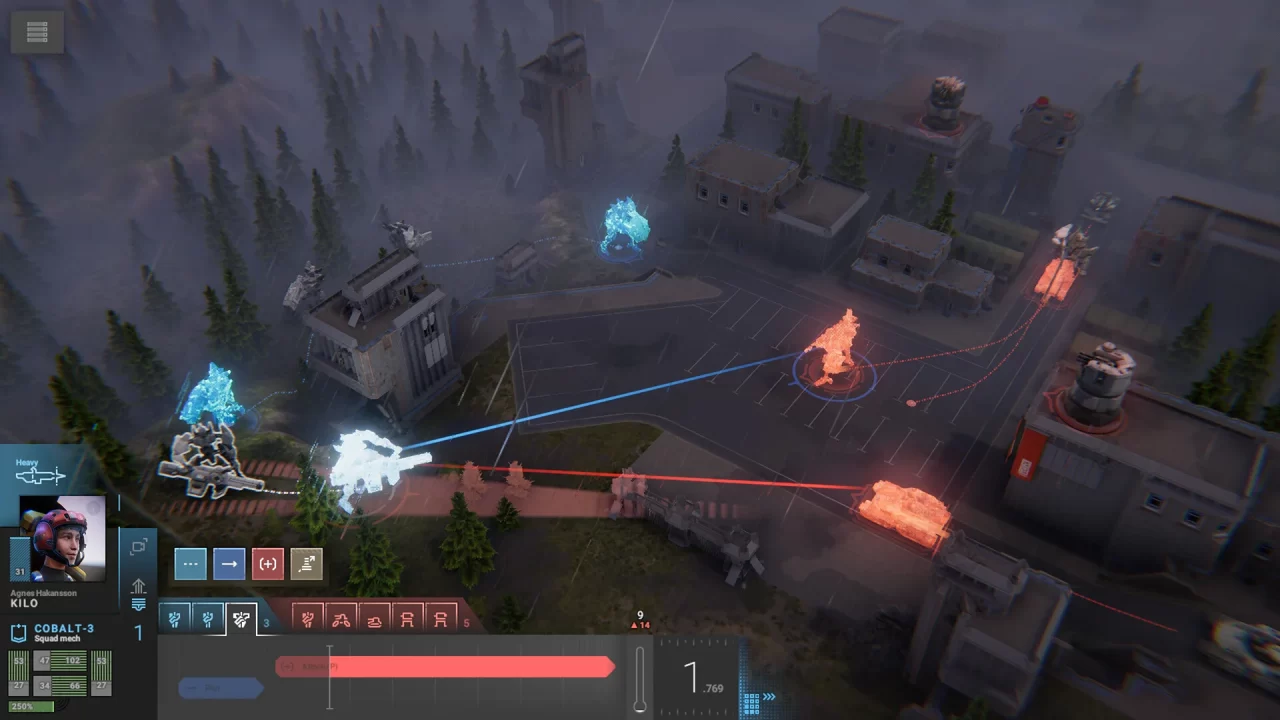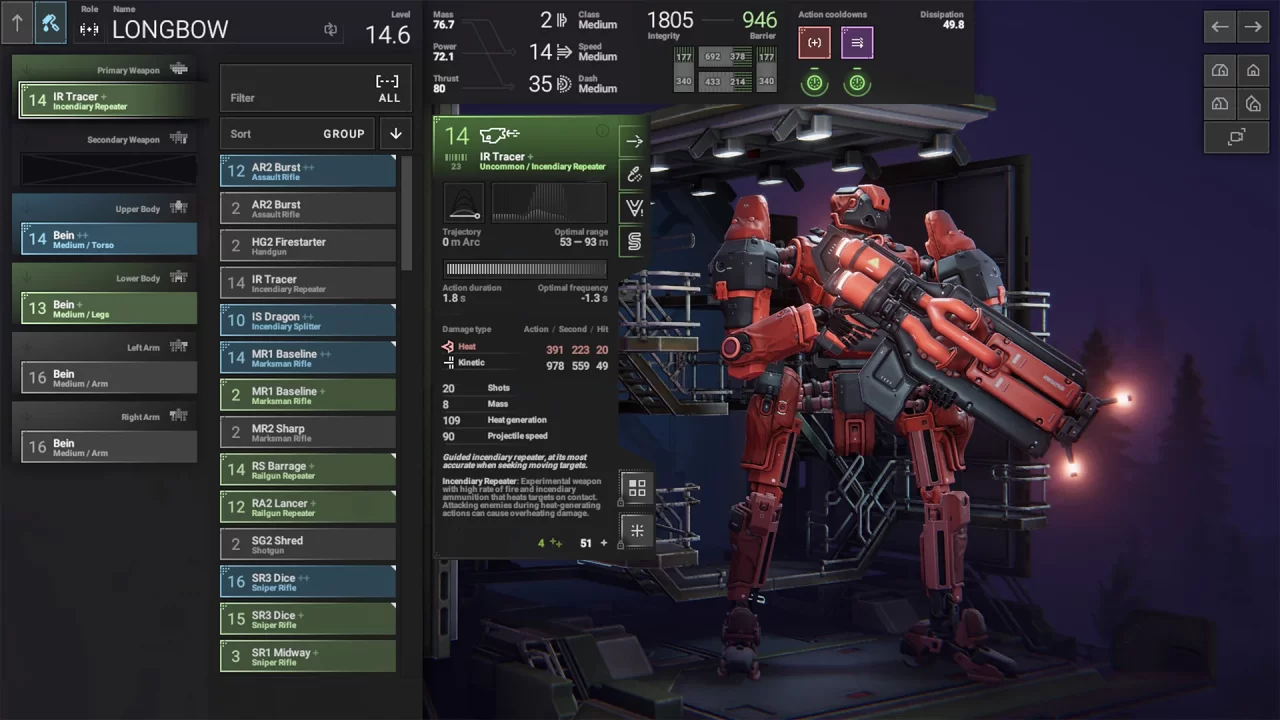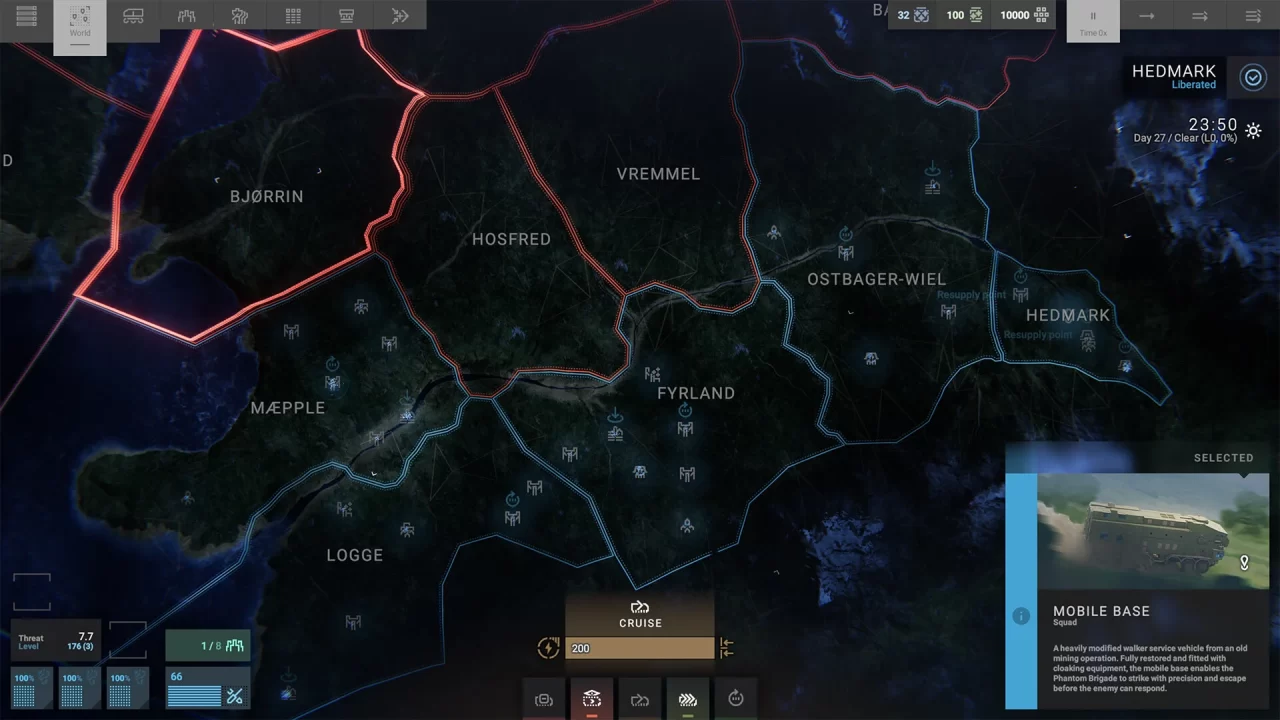Mechs. Mechs never change. What is there that hasn’t already been done with mechs in video games? Brace Yourself Games imagined up something new in tactical RPG Phantom Brigade with an ambitious battle system. Ambition is great, but it doesn’t always translate to something enjoyable. In Phantom Brigade, the machine works, but how does it hold up when pressure is applied?
Phantom Brigade was born and bred for battle. It’s a turn-based system with many twists. Combat centers on a prediction system, predictably named the Prediction System, which predictably predicts the enemy’s movements each turn. It’s nifty for your side to have access to this technology when the enemy doesn’t. Each turn, you get to program five seconds of real-time action at a time. Each of your units has a track, similar to an audio editor, that represents your actions as layers. Each action takes up a different amount of time, but there are some actions you can program to run simultaneously.
As you’re programming, you can see how enemies will respond to your actions, which change as you work. It all takes place in a free-roaming environment with no grid. The system allows for a lot of flexibility, and it’s fun to watch once you hit the button and make everything go. Mechs fire off their weapons with explosions blasting as the munitions slam into other mechs. Errant fire causes buildings to crumble onto any mechs in the area. You’re essentially plotting one cinematic sequence after the next until one side is defeated. Managing all the moving parts, trying to get your mechs within range specific to their weapons, diving behind a building for cover from an attack, then popping back out to counter—commanding your units in battle is ridiculously dynamic and fun. The environment plays an important role, too. A battle in a city’s tight quarters plays out differently from a fight in a more open plain. Post your sniper on top of a hill and control the battlefield. Phantom Brigade’s battles consistently present new situations to blast your way through.
If it sounds too easy to know everything the enemy is doing, that’s not exactly true. The biggest challenge in Phantom Brigade is keeping your units out of each other’s way. I made plenty of rookie mistakes where I was sure I’d be blowing enemies away with my most potent weapons, only to realize I had “strategically” sent another of my units into the line of fire, efficiently cutting it down. The other issue is making sure the units don’t run into each other, which causes them to both fall down and temporarily crash, like some black-and-white slapstick comedy. You’re also typically fighting enemies who are more powerful than you, so failure to respect them can easily spell doom for your troops.
Thankfully, when you defeat those more powerful enemies, you get to take their stuff. Between battles, re-equipping units keeps the fighting fresh. Even though each piece of equipment has a giant number representing its overall value, paying attention to the fine details is essential to use those guns effectively. Do you want a weapon that deals more direct damage, or do you want more concussion damage to try to knock out pilots more quickly? Each weapon behaves differently on the battlefield, so you need hands-on experience with them in addition to the stats. Phantom Brigade might appeal most to those who love micromanagement. The loot is so well integrated with actual combat, and the fact that you must pay attention to the details is far better for a strategy game than the ability to mindlessly toss in every new item you get.
The combat is excellent and all, but what about the parts between the fighting? Unfortunately, once you step off the battlefield, the quality is much less consistent.
There’s not much to talk about regarding the story. The nameless enemy attacks suddenly, taking control of your nameless country. Then, your small force of survivors, appropriately named the Phantom Brigade, strikes back and regains control. The end. The narrative takes an “organic” approach to storytelling. Occasionally, while exploring or when you win important battles, events in the form of block text pop up to provide narrative progression. It’s not that they’re poorly written because they are enjoyable to read and provide a human element to this massive war. But there’s not much to personalize the experience.
For instance, as you’re traveling, you find someone tied to a tree, so what do you do? You have several optional responses. But this person doesn’t have a name, nor do your troops arguing over what to do. Then, the events also repeat. It’s cool the first time this comes up. After the 20th time, it just washed over me without a thought. Your pilots are the only named characters, but they’re so interchangeable that it’s difficult to feel anything for them. When they get killed, you simply need to recruit more, which is more of a hassle than a feeling of loss. On the other hand, it is great when you find the dog and adopt it, and the game informs you you’ve gained “+1 dog.”
The overworld layer is mostly monochromatic and bland. It’s similar to Total War if that series ever were to take up a futuristic setting with mechs and if you only controlled a single unit. Your mobile station rolls along in real-time between provinces, and you’re trying to take control of each province in the homeland, one by one. Each province has several landmarks, like enemy bases and cities. There are also enemy units roaming about that hone in on you if you get too close. Each of these landmarks represents a potential battle. Winning so many battles in a province captures it for your side.
Everything you do in each province integrates to build a macro story. As you travel about winning or losing battles, you can see the skeleton of a traditional RPG story form, but without any flavor. For instance, you knock out the outpost and the security unit so the Home Guard can easily capture the enemy’s base in this province. You could see a story with colorful characters and details written around that basic framework, except that all Phantom Brigade provides is the framework. There are also neat writeups about each province, yet your experience in each is nearly identical. One province has a reputation for having more sheep than people, yet I never had a single sheep encounter. It’s up to you to fill in the details if you have the imagination. That works for some people, but if you want a fun story you can participate in rather than imagine, you won’t find that here. As the battle system presents freedom, so does the overworld. You can go wherever you want; there’s just nowhere interesting to go. In many areas, the developers needed to go one step further to drive the game home.
Visually, the battles are spectacular. The mechs are nondescript and slightly on the cartoony side. It almost could have been titled “Advance Wars: Extreme” or something, and it would have been fitting. But once everything goes into motion, it’s a visual paradise. There’s some environmental storytelling, as you spot sights like a harvesting combine sitting in a half-tilled cornfield, suggesting a once peaceful life upended by war. On the other hand, the overworld map lacks details, which contributes to the lackluster experience. Aurally, Phantom Brigade delivers. Battles are full of action, with the sounds of the mechs’ mechanisms whirring, setting the machines into motion with each new turn. It’s easy to hear weapons firing and slamming into the mechs. There are only a few music tracks, but the calmer electronic sounds of the overworld theme are wonderfully contemplative as you plan your next move, and the main menu theme gets you in the mood to take back the homeland.
Phantom Brigade contains two distinctive halves: the lovingly crafted battle system and the almost-but-not-quite overworld. It’s understandable that a first-time team with an excellent idea would choose to be laser-focused on that one idea, but the game could have been a classic if the rest were fleshed out. In a crowded factory of mech games, Phantom Brigade performs well in combat; it’s just not much to look at.





